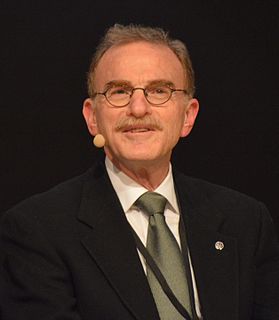A Quote by Robert Lanza
Perhaps, if science is clever enough to see, it will realize that religion may not be too far off with its concrete imagery; and that relative to the supreme creator, we humans are much like the microorganisms we scrutinize under the microscope.
Related Quotes
Virtue will catch as well as vice by contact; and the public stock of honest manly principle will daily accumulate. We are not too nicely to scrutinize motives as long as action is irreproachable. It is enough (and for a worthy man perhaps too much) to deal out its infamy to convicted guilt and declared apostasy.
Science has only two things to contribute to religion: an analysis of the evolutionary, cultural, and psychological basis for believing things that aren't true, and a scientific disproof of some of faith's claims (e.g., Adam and Eve, the Great Flood). Religion has nothing to contribute to science, and science is best off staying as far away from faith as possible. The "constructive dialogue" between science and faith is, in reality, a destructive monologue, with science making all the good points, tearing down religion in the process.
You will find men like him in all of the world's religions. They know that we represent reason and science, and, however confident they may be in their beliefs, they fear that we will overthrow their gods. Not necessarily through any deliberate act, but in a subtler fashion. Science can destroy a religion by ignoring it as well as by disproving its tenets. No one ever demonstrated, so far as I am aware, the nonexistance of Zeus or Thor, but they have few followers now.
When you put relative and absolute truth together and they become one unit, it becomes possible to make things workable. You are not too much on the side of absolute truth, or you would become too theoretical. You are not too much on the side of relative truth, or you would become too precise. When you put them together, you realize that there is no problem.
Our incomes should be like our shoes, if too small, they will gall and pinch us, but if too large, they will cause us to stumble and to trip. Wealth, after all, is a relative thing, since he that has little and wants less is richer than he that has much but wants more. True contentment depends not upon what we have; a tub was large enough for Diogenes, but a world was too little for Alexander.
Science is like society and trade, in resting at bottom upon a basis of faith. There are some things here, too, that we can not prove, otherwise there would be nothing we can prove. Science is busy with the hither-end of things, not the thither-end. It is a mistake to contrast religion and science in this respect, and to think of religion as taking everything for granted, and science as doing only clean work, and having all the loose ends gathered up and tucked in. We never reach the roots of things in science more than in religion.
If you can't fail then how can you possible develop as a communicator or as a creator of anything? We are locked into a deeply unhealthy notion that somehow you've got to succeed all the time. An appalling notion. Any painter or writer will tell you that that is no way to proceed. One of the things that will kill off a decent actor, especially a young actor early on and they will never recover from it, is too much success. It's disastrous. You stop being criticized, therefore you stop challenging yourself. You then can't afford to fail because there's too far to fall.




































